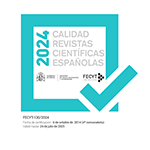¿Por qué nació la juntura «Tradición Clásica»? Razones historiográficas para un concepto moderno
Abstract
The term «Classical Tradition» is a join of historiographical nature. It was thought mainly to signify a kind of relationship («a in b») between the Ancient and the Modern literatures, as far as the first ones were understood as an object of study different from the second ones. At the beginning, the terms of «tradition» and «traditional studies» were referred, by default, to the educated field of the Greek-Latin heritage. However, in a certain moment it was necessary to fix the adjective «classical», because of the progress of the studies on the new both folk and modern traditions. The old adjective «classical», a metaphor taken from the social field to point out the best authors in an idealistic and timeless literary republic, added a historical dimension to its aesthetic meaning: the classical literatures and languages, as a category referred to the Greek and Roman Antiquity. Likewise, the meaning of this adjective was restricted in opposition to «modern», «Christian» and «folk».Downloads
Article download
License
In order to support the global exchange of knowledge, the journal Cuadernos de Filología Clásica. Estudios latinos is allowing unrestricted access to its content as from its publication in this electronic edition, and as such it is an open-access journal. The originals published in this journal are the property of the Complutense University of Madrid and any reproduction thereof in full or in part must cite the source. All content is distributed under a Creative Commons Attribution 4.0 use and distribution licence (CC BY 4.0). This circumstance must be expressly stated in these terms where necessary. You can view the summary and the complete legal text of the licence.








